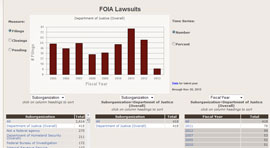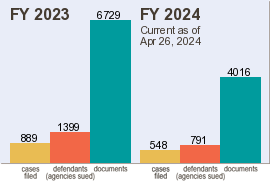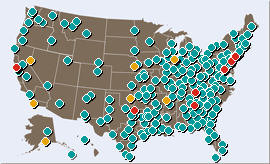The New York Times Company v. Federal Bureau of Investigation and 9 other new FOIA lawsuits, plus case descriptions
We have added 49 documents from 9 FOIA cases filed between May 1, 2022 and May 7, 2022. Note that there can be delays between the date a case is filed and when it shows up on PACER. If there are filings from this period that have yet to be posted on PACER, this FOIA Project list may not be complete.
Click on a case title below to view details for that case, including links to the associated docket and complaint documents.
- The New York Times Company v. Federal Bureau of Investigation (filed May 4, 2022)
The New York Times submitted a FOIA request to the FBI for records concerning the FBI Behavior Analysis Unit’s report that found that Havana Syndrome was a mass psychosis/functional illness. The agency acknowledged receipt of the request. The agency told the New York Times that its request would take 1,929 days to complete. The New York Times then filed suit.
Issues: Litigation – Attorney’s fees, Failure to respond within statutory time limit, Adequacy – Search - WILDERNESS WORKSHOP v. U.S. BUREAU OF LAND MANAGEMENT et al (filed May 2, 2022)
The Wilderness Workshop submitted a FOIA request to the Bureau of Land Management for records concerning the Trail Gulch Unit and associated oil and gas leases within the North Fork Mancos Master Development Plan. The agency acknowledged receipt of the request. The agency provided four interim releases of records but after hearing nothing further from the agency, Wilderness Workshop filed suit.
Issues: Failure to respond within statutory time limit, Adequacy – Search, Litigation – Vaughn index, Litigation – Attorney’s fees - PUBLIC EMPLOYEES FOR ENVIRONMENTAL RESPONSIBILITY v. UNITED STATES GEOLOGICAL SURVEY (filed May 5, 2022)
Public Employees for Environmental Responsibility submitted three FOIA requests to U.S. Geological Survey for records concerning James Applegate’s April 19, 2021 response to PEER Senior Counsel Peter Jenkins regarding a multi-NGO letter pertaining to the accreditation of USGS’s wildlife disease laboratories. The agency acknowledged receipt of the requests but after hearing nothing further from the agency, PEER filed suit.
Issues: Failure to respond within statutory time limit, Litigation – Attorney’s fees - PROTECT THE PUBLIC'S TRUST v. U.S. DEPARTMENT OF HOMELAND SECURITY (filed May 5, 2022)
Protect the Public’s Trust submitted a FOIA request to the Department of Homeland Security for records concerning meeting calendars and travel logs for Secretary Mayorkas. PPT also requested a fee waiver. The agency acknowledged receipt of the request and granted PPT’s request for a fee waiver. After hearing nothing further from the agency, PPT filed suit.
Issues: Failure to respond within statutory time limit, Litigation – Vaughn index, Litigation – Attorney’s fees - ENERGY POLICY ADVOCATES v. WHITE HOUSE OFFICE OF SCIENCE AND TECHNOLOGY POLICY (filed May 5, 2022)
Energy Policy Advocates submitted three FOIA requests to the Office of Science and Technology for records concerning communications between staffers Eric Lander and Jane Lubchenco and various press or public interest groups. The agency acknowledged the requests and disclosed 15 pages with redactions under Exemption 5 (privileges) in response to the first request. EPA filed an administrative appeal. The agency granted the appeal in part and disclosed some redacted materials. However, after hearing nothing further from the agency in response to its other two requests, EPA filed suit.
Issues: Failure to respond within statutory time limit, Public Interest Fee Waiver, Litigation – Attorney’s fees - BROCKMAN v. INTERNAL REVENUE SERVICE (filed May 6, 2022)
Robert Brockman submitted a FOIA request to the IRS for records concerning notices of jeopardy assessments and tax liens pertaining to him. He also asked for expedited processing. The agency acknowledged receipt of the request. The agency disclosed the records in encrypted form and sent Brockman and key to decrypt the files. Brockman contended the key did not work and without further information from the agency he could not contest the tax assessments. After hearing nothing further from the agency, Brockman filed suit.
Issues: Litigation – Vaughn index, Litigation – Attorney’s fees - The New York Times Company et al v. Executive Office for United States Attorneys (filed May 4, 2022)
The New York Times submitted a FOIA request to the Executive Office of U.S. Attorneys for records concerning the May 5, 2020 interview of Edward William Priestap by the U.S. Attorney for the Eastern District of Missouri. The New York Times also requested expedited processing. The agency acknowledged receipt of the request and denied the Times’ request for expedited processing. The agency denied the request on the basis that the interview was protected by a judicial order. The New York Times filed an administrative appeal, arguing that the judicial order did not apply to the interview. After hearing nothing further from the agency, the New York Times filed suit.
Issues: Failure to respond within statutory time limit, Adequacy – Search, Litigation – Attorney’s fees - Koch et al. v. U.S. Department of Justice (filed May 6, 2022)
William Koch and Bradley Goldstein, a writer specializing in wine, submitted a FOIA request to the Department of Justice for records concerning the investigation of Rudy Kruniawan. The agency acknowledged receipt of the request and denied it in full under Exemption 6 (invasion of privacy) and Exemption 7(C) (invasion of privacy concerning law enforcement records). Koch and Goldstein filed an administrative appeal. EOUSA denied the appeal. Koch and Goldstein then filed suit.
Issues: Litigation – Attorney’s fees - CATO INSTITUTE v. U.S. SECRET SERVICE et al (filed May 2, 2022)
The Cato Institute submitted a FOIA request to U.S. Secret Service for records concerning intelligence reports that mentioned the terms “anarchist,” “anti-fascists”, or “Youth Liberation Front.” The agency acknowledged receipt of the requests and told the Cato Institute the request was too broad to search. The Cato Institute filed an administrative appeal, arguing that the request was not too broad. The agency agreed to search a narrowed request but indicated it would need to review thousands of files to conduct a search. After hearing nothing further from the agency, the Cato Institute filed suit.
Issues: Failure to respond within statutory time limit, Adequacy – Search, Litigation – Attorney’s fees
In addition, we have added 1 document from 1 case, with an earlier filing date, that has recently appeared on PACER.
- CASE NUMBER NOT USED (filed Apr 25, 2022)
No comments yet
 Recent Tweets
Recent Tweets


